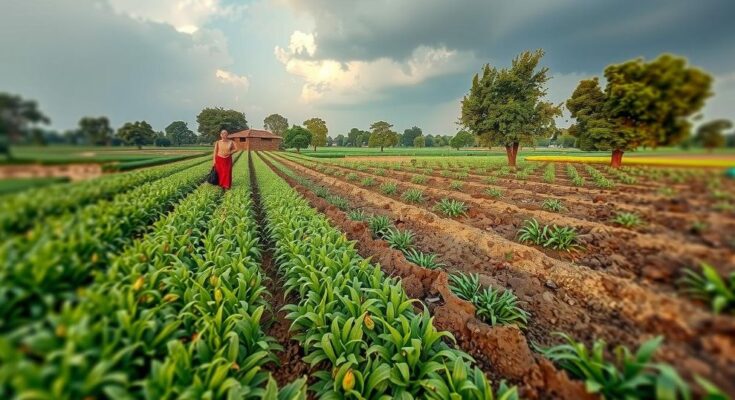A recent study posits that enhancing South Sudan’s plant health system can significantly reduce crop losses from climate change-related invasive pests, such as fall armyworms and other diseases impacting food security. Despite a reliance on agriculture for livelihoods, farmers face limited access to essential plant health services, necessitating a strategic intervention from both government and agricultural organizations to bolster support and knowledge among local farmers.
A recent investigation conducted by the Centre for Agriculture and Bioscience International (CABI), as published in the CABI Agriculture and Bioscience journal, indicates that reinforcing the plant health system in South Sudan is crucial for mitigating crop losses attributed to climate change-induced invasive pests. The study outlines that climatic shifts have facilitated the intrusion of numerous new pests and diseases impacting vital crops, including elegant grasshoppers (Zonocerus sp.), various bollworms, cassava whiteflies, cutworms, African armyworms, stalk borers, and aphids. The fall armyworm (FAW) has emerged as a particularly concerning pest in South Sudan, identified as a primary threat linked to climate change. The Food and Agriculture Organization (FAO) highlighted this in a 2017 report. South Sudan is recognized as a climate change hotspot, experiencing a surge in extreme climatic events detrimental to plant health. This situation poses a significant risk, especially considering that approximately 86% of rural households in South Sudan rely on agriculture for their livelihoods, as stressed in a 2023 report by the United Nations Environment Programme (UNEP). Furthermore, a situational analysis involving 960 farmers across Juba, Yambio, and Yei revealed a concerning lack of access to critical plant health services, including advice, extension services, and educational training. Consequently, farmers frequently rely on non-governmental organizations (NGOs) and UN agencies for assistance, illuminating a notable absence of government initiatives. The fall armyworm is significantly damaging various crops, particularly maize, which is a staple in South Sudan, but it also affects sorghum, millet, and vegetables. Reports from various regions, such as Equatoria and Northern Bahr el Gazal, confirm the presence of this invasive pest. Moreover, the World Bank reported in 2022 that significant plant diseases—including cassava mosaic virus and blight affecting tomatoes—pose additional threats. While precise data on agricultural yield losses due to climate change remains sparse, 87% of South Sudan’s population is reported to face moderate to severe food insecurity, largely due to climate-induced adversities such as pest outbreaks, disease, and extreme weather events. For instance, the papaya mealybug, identified as a new pest, has been reported to cause yield losses up to 91%, jeopardizing the livelihoods of smallholder farmers. Cassava diseases, including the cassava brown streak disease and cassava mosaic disease, are speculated to incur significant economic losses, estimated at US$100 million and up to US$2.7 billion annually, respectively. The overarching challenges within South Sudan’s plant health system are characterized by weak regulatory frameworks, inadequate institutional capacities, and a reliance on imported seeds and services due to the scarcity of quality planting materials. The historical progression of the plant health system from reliance on traditional practices to modern integrated pest management shows potential for improvement. The study advocates for a holistic approach to plant health service delivery, emphasizing the need for strategic interventions that directly address these challenges. There exists an opportunity to enhance agricultural productivity through farmer education and increased access to pest management resources, ultimately fostering sustainable agricultural practices across South Sudan.
The article discusses a significant study by the Centre for Agriculture and Bioscience International highlighting the need to fortify the plant health system in South Sudan to combat the rise of invasive pests fueled by climate change. The interplay between climate change, invasive species, and agricultural productivity forms the crux of the study, underlining the precarious state of plant health and food security in a country heavily reliant on agriculture for the livelihood of the majority of its rural population. The study also assesses the capabilities of the existing plant health services, acknowledging the reliance on external agencies while pointing out gaps in government initiatives.
In conclusion, strengthening the plant health system in South Sudan is imperative to counteract the escalating threat posed by climate change-induced pests. The study reveals alarming gaps in services and support for local farmers, which must be addressed to ensure food security and sustainability in agricultural practices. By implementing strategic interventions and fostering collaboration between farmers and agricultural institutions, South Sudan can improve its resilience against the challenges introduced by climate change and invasive pests.
Original Source: farmersreviewafrica.com




